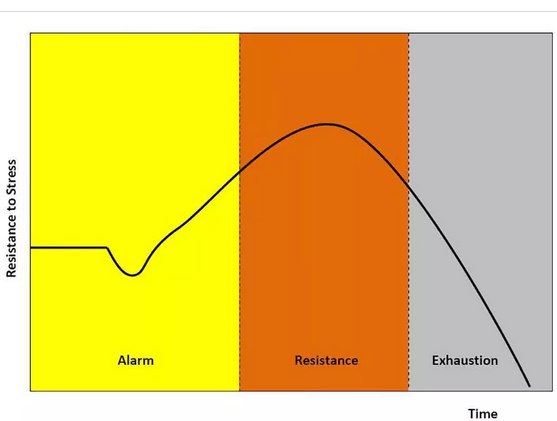Stress is a common occurrence. While you can’t remove every single stressor from your life, it’s possible to manage stress and maintain your health. This is important because stress can cause mental fatigue, irritability, and insomnia.
But even if you know the physical effects of stress, you may be unaware of the different stages of stress, known as general adaptation syndrome (GAS). When you understand the different stages of stress and how the body responds in these stages, it’s easier to identify signs of chronic stress in yourself.
GAS is the three-stage process that describes the physiological changes the body goes through when under stress. Hans Selye, a medical doctor and researcher, came up with the theory of GAS. During an experiment with lab rats at McGill University in Montreal, he observed a series of physiological changes in the rats after they were exposed to stressful events.
With additional research, Selye concluded that these changes were not an isolated case, but rather the typical response to stress. Selye identified these stages as alarm, resistance, and exhaustion. Understanding these different responses and how they relate to each other may help you cope with stress.

General adaptation syndrome stages
-
Alarm reaction stage
The alarm reaction stage refers to the initial symptoms the body experiences when under stress. You may be familiar with the “fight-or-flight” response, which is a physiological response to stress. This natural reaction prepares you to either flee or protect yourself in dangerous situations. Your heart rate increases, your adrenal gland releases cortisol (a stress hormone), and you receive a boost of adrenaline, which increases energy. This fight-or-flight response occurs in the alarm reaction stage.
-
Resistance stage
After the initial shock of a stressful event and having a fight-or-flight response, the body begins to repair itself. It releases a lower amount of cortisol, and your heart rate and blood pressure begin to normalize. Although your body enters this recovery phase, it remains on high alert for a while. If you overcome stress and the situation is no longer an issue, your body continues to repair itself until your hormone levels, heart rate, and blood pressure reach a pre-stress state.
Some stressful situations continue for extended periods of time. If you don’t resolve the stress and your body remains on high alert, it eventually adapts and learns how to live with a higher stress level. In this stage, the body goes through changes that you’re unaware of in an attempt to cope with stress.
Your body continues to secrete the stress hormone and your blood pressure remains elevated. You may think you’re managing stress well, but your body’s physical response tells a different story. If the resistance stage continues for too long of a period without pauses to offset the effects of stress, this can lead to the exhaustion stage.
Signs of the resistance stage include:
- Irritability
- Frustration
- Poor concentration
-
Exhaustion stage
This stage is the result of prolonged or chronic stress. Struggling with stress for long periods can drain your physical, emotional, and mental resources to the point where your body no longer has strength to fight stress. You may give up or feel your situation is hopeless. Signs of exhaustion include:
- Fatigue
- Burnout
- Depression
- Anxiety
- Decreased stress tolerance
The physical effects of this stage also weaken your immune system and put you at risk for stress-related illnesses.
GAS can occur with any type of stress. Stressful events can include:
- A job loss
- Medical problems
- Financial troubles
- Family breakdown
- Trauma
But while stress is unpleasant, the upside is that GAS improves how your body responds to stressors, particularly in the alarm stage.
The fight-or-flight response that occurs in the alarm stage is for your protection. A higher hormone level during this stage benefits you. It gives you more energy and improves your concentration so you can focus and tackle the situation. When stress is short-term or short-lived, the alarm stage isn’t harmful.
One thought on “General Adaption Syndrome (GAS) Concept & Stages”